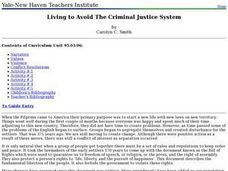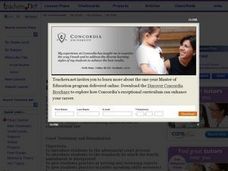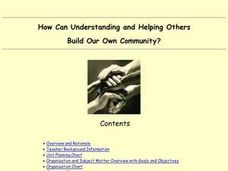Curated OER
State Symbols
Third graders examine the symbolism of the United States by observing different flags. In this U.S. History lesson, 3rd graders utilize the Internet to research state seals, flags, and other symbols that represent specific areas of our...
Curated OER
How We Got to Kansas-Nebraska
Students explore the causes of the Civil War. In this instructional activity on slavery students use primary sources to examine the evolution of the issue of slavery and in the American political system. Students will then write a...
Curated OER
Living to Avoid The Criminal Justice System
Students brainstorm a list of negative stereotypes in the African-American society. In groups, they develop ways to decrease the chance of them living in poverty and being in trouble with the law. They develop ways to solve problems...
Curated OER
Nativist and Racist Movements in the U.S. and their Aftermath
Students examine the nativist and racist movements in the history of the United States. In groups, they analyze the reactions of religious and ethnic groups to these movements and create a chart to compare the goals of each group. To...
Curated OER
Soil Composition: Then and Now
Students identify the location of their school from a 1926 digitized Soil Sample map. Using remaining landforms, they determine the type of soil identified during that time, and compare it to the soil currently found near the school.
Curated OER
Studying and Working: The Busy Lives of Students With Paid Employment
Students investigate the effect of paid employment on academic performance. They examine how to construct a survey on time use.
Curated OER
Courtroom Testimony and Presentation
Twelfth graders examine the court process and practice writing and reviewing reports. They practice their public speaking skills as they pretend to present information to a court.
Curated OER
How Can Understanding and Helping Others Build Our Own Community?
Young scholars examine the different cultures and disabilities people face in their community. They discuss how they can become better citizens. They answer discussion questions to finish the lesson plan.
Curated OER
Ancient Greece: Inquiring Minds Want to Know
Second graders explore world history by writing newspaper articles. In this Greek history lesson, 2nd graders investigate the geography and society of Ancient Greece by utilizing the Internet as a research tool. Students collaborate with...
Curated OER
Revisiting Pocahontas
Students discuss the characteristics that make a historical resource reliable. As a class, they brainstorm a list of examples of possible historical resources and why they are important. In groups, they discover the consequences of...
Curated OER
DNA Fingerprinting
Students experiment with chromatography as a technique which is similar to electrophoresis that scientists use to identify DNA samples.
Curated OER
The Respiratory System
Students explore the parts of the respiratory system in this six lessons unit. The lessons presnt the concepts of the breathing, the function of oxygen in the system, how sounds are made, and the effects of pollution, smoking and disease...
Curated OER
Hazelwood v. Kuhlmeier
Middle schoolers read the case text of the Hazelwood v. Kuhlmeier case. Using the text, they discuss the case history and the implications of the verdict. They share their findings with the class in the form of a PowerPoint presentation...
Curated OER
Individual Rights -- Freedom of Speech at School
Students examine their individual rights at a public school. In groups, they identify the most common ways of expressing themselves and why they should limit their speech in public. They compare and contrast two cases in which they...
Other popular searches
- Us Constitution Amendments
- The Us Constitution
- Us Constitution Day
- Us Constitution Word Puzzles
- Us Constitution Lessons
- Amending the Us Constitution
- Us Constitution Test
- Us Constitution Projects
- Us Constitution Activity
- Forming the Us Constitution
- Us Constitutional Convention
- Us Constitution Article 1















